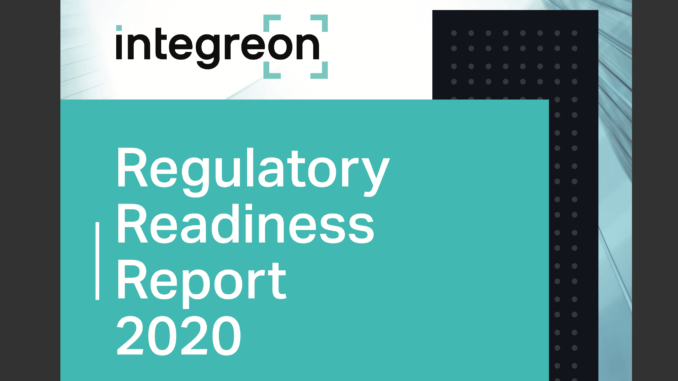
A new report by Integreon has found that 62% of law firms currently feel client cost pressure when helping corporates with regulatory and compliance work. This cost pressure comes as the regulatory burden on companies continues to expand with a growing raft of measures on both a national and global level.
The Regulatory Readiness Report, which surveyed 200 compliance and legal professionals in the US and UK, also found that only 56% of corporations believe they are well-prepared for Brexit. I.e. just under half are not – and that is something of a concern given that the UK is hurtling toward the final stages of departure from the EU.
That said, part of this lack of preparation may be due to the fact that the UK and EU are still frantically negotiating very significant areas of policy.
Other regulatory and compliance areas of concern, among others, highlighted by the survey, included:
- Only 53% of corporations believe they are well-prepared for the LIBOR transition as the LIBOR reference rate expires on December 31, 2021.
And,
- Only 43% of corporations believe they are ready for IM5 (initial margin regulations for derivatives) which has a deadline of September 1, 2021.
Facing cost pressures on what is often high volume work is driving some law firms to develop their own legal process groups, often outside of their main office centres. Meanwhile, the move to remote working may help in that regard, i.e. in terms of reducing the cost base of putting together a process team where it no longer may matter where a person is based.
Law firms may also find they need to work hand-in-hand with dedicated process groups – and these are expanding rapidly in size and number, from the Big Four’s LMS teams, to legal process groups such as Elevate, UnitedLex and Factor. No doubt the report backers, Integreon, are hoping that this will be one of the main outcomes. That said, regardless of who made the report, the facts remain: there is a ton of compliance work out there, it’s growing year by year, and there needs to be a way of handling it at a sensible cost and in an efficient way.
In turn, wherever there is a high volume or significant frequency of similar legal activity there is an opportunity to leverage technology, not just because it will reduce costs and drive efficiency, but because such partially-automated approaches can instil a level of uniformity of response, which if managed well can reduce risk. (Note: and if handled badly could increase risk……)
Despite this need, 82% of the corporations surveyed agreed that responding to regulatory changes creates ‘operational pressure’ for their business, with 69% saying that increased regulation is having a negative effect on profitability and growth.
I.e. handling the growing burden of regulation is harming company profits, and at the same time they are under pressure to do this compliance work without excessive costs. But many, aside from the very largest, don’t have the internal capacity to handle these increasing waves of regulatory work.
Overall then, a clear opportunity for both tech companies and legal services providers with a scalable process capability.
‘Corporate compliance teams are being stressed by regulatory requirements, which have globally ballooned five-fold from 2009 to 2019, according to Thomson Reuters data. The report showed the substantial impact this is having on corporations and their law firms,’ concluded Bob Rowe, CEO of Integreon.